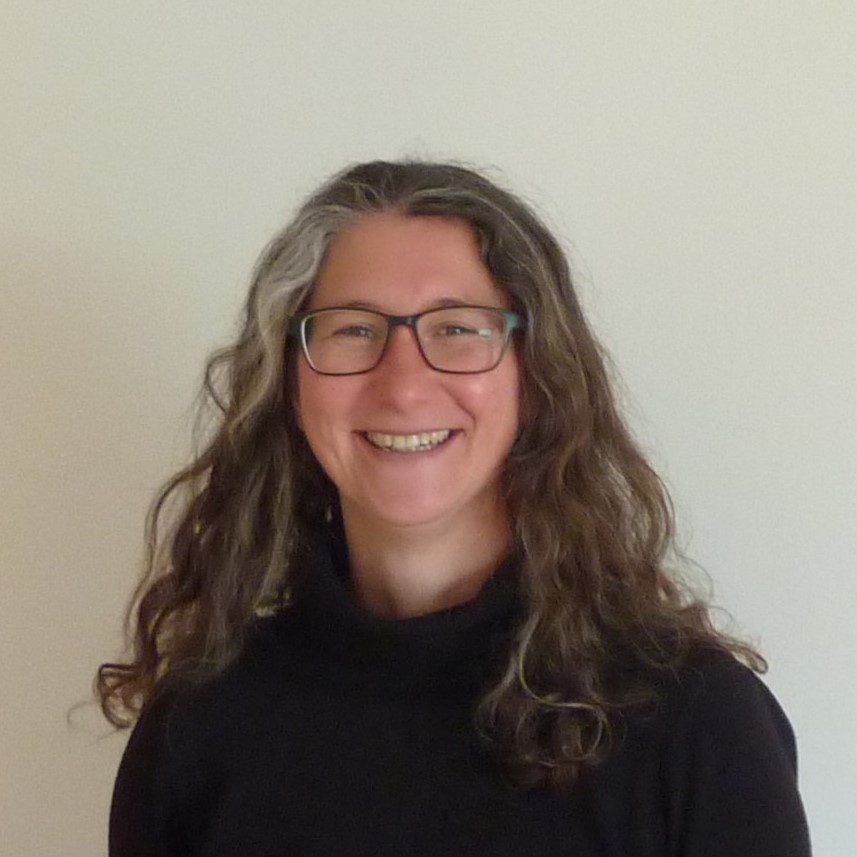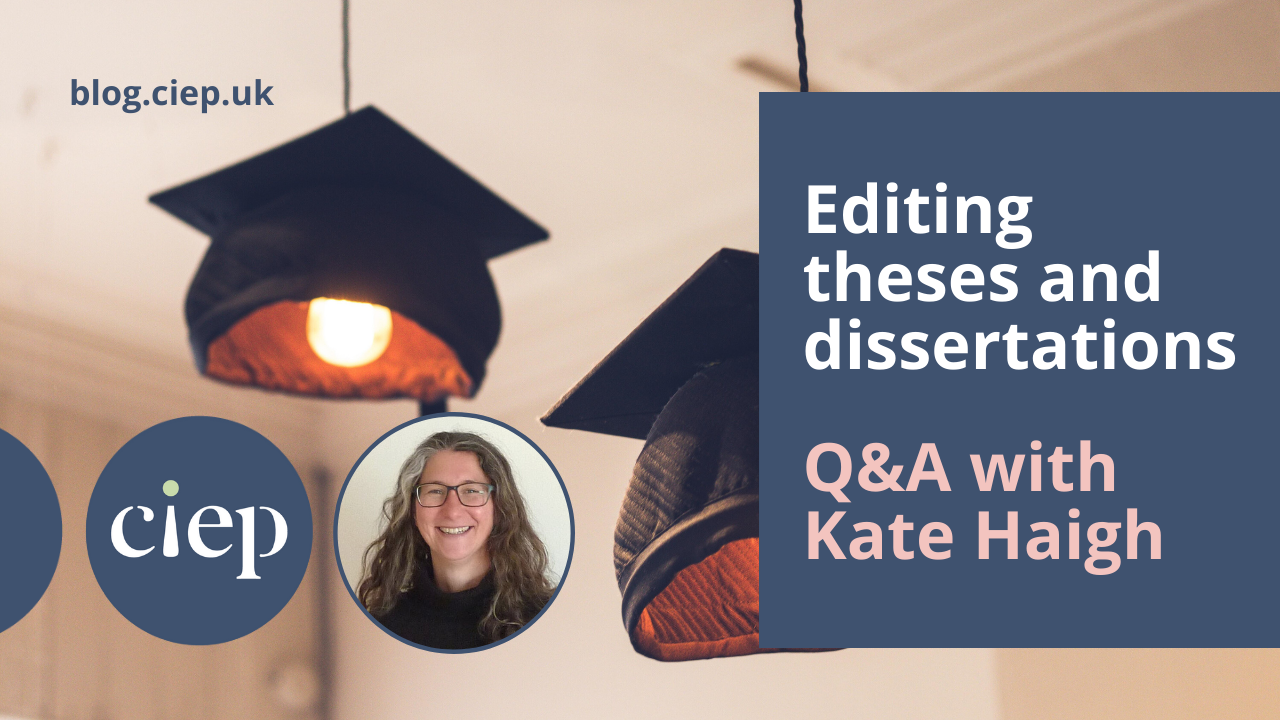Often when students ask a proofreader to look at their thesis or dissertation, this is their first experience of working with an editorial professional. Advanced Professional Member Kate Haigh shares her experiences and tips for success.
What services do you offer in relation to theses/dissertations?
I generally only offer proofreading services for work that is to be submitted for assessment. With permission from supervisors, I also offer copyediting services.
My website goes into detail on this because I think the terms ‘proofreading’ and ‘copyediting’ are not always very clear to those outside the traditional publishing world. Even ‘copyediting’ doesn’t exactly nail the service I provide, as it’s more of a general language edit. I will flag contentious language but I don’t generally deal with style (though can address passive/active verbs), and I don’t deal with structure.
I don’t fact-check or comment on the key arguments. This is where working on theses and dissertations differs from almost all other types of work because of plagiarism and collusion concerns.
My Ts and Cs detail what the services include so that my clients are clear on what I will be doing and what to expect. Also, universities often have rules on what a proofreader/editor can or can’t do; it’s essential that the student is aware of those and passes those details to me because I don’t want to intervene more than is allowed and jeopardise their studies.
Why did you decide to start working in this field?
When I was on my year abroad in Germany as part of my degree, I had to write a dissertation in German. My tutor suggested I get the text proofread, which was something I’d never have thought of and in fact might have considered it cheating since I thought I was being assessed for my German-language skills. The reality was that the content was what mattered, though if my German hadn’t been understandable, the content would have been lost.
This process stuck with me and so when I was setting up Kateproof in 2010, I did a SWOT analysis and realised that students would benefit from my services. At the time, I lived in a very student-populated town so it felt like a great marketing opportunity. I was able to make connections with local universities and took things from there. Once my web presence got established and word-of-mouth referrals started spreading, I built a client base of students and academics across the UK and the world.
Do you have a subject specialism?
No, I make sure to emphasise to clients that I am not a specialist in their field, but my more generalist approach often helps to ensure clarity. Acronyms and jargon exist in theses and dissertations just like in many other publications, so this distance from a topic can help, especially if readability is a concern.
That said, I recommend that students writing very technical theses find someone with more of a maths/science background.
What types of students/clients do you work with?
I now mainly work with postgraduates on longer dissertations and theses or on articles being submitted for publication that might become part of their thesis. I do work with undergraduates but my minimum fee means this is often not the most cost-effective option for a 3,000-word essay.
I work for students of all backgrounds, whether English is their first or fifth language. Imagine if you’ve spent four years working on a thesis – you’re too close to the text. Passing the file to a proofreader is often a relief for them, as a fresh pair of eyes will pick up on things that might otherwise have been missed.
What do you enjoy about working on theses/dissertations?
Over the years, I’ve realised I much prefer working directly with clients. It’s great to have the rapport and relationship with a client as I find it’s much easier for both parties to have clear boundaries and expectations on what I will do.
I’ve also got clients who are academics now but I started working with them at master’s level so it’s great to keep that client relationship going.
I love the variety, not just of topics but also with style guides and reference systems. It feels like I am learning while working and that’s always a positive. It’s great for quizzes, too.
What are the benefits to students of engaging an editorial professional to work on their thesis/dissertation?
Different universities will have different grading rules but if the text isn’t clear or has numerous errors and inconsistencies, that will have an impact on the grade or on whether a student passes or fails.
If funds are tight, students can get friends or family to proofread the work, but the specific benefit of working with an editorial professional is that we have years of experience doing this and usually have software to help us pick up on the finer details.
How far in advance would you advise students to contact an editorial professional?
This comes down to the size of the project and the flexibility of the schedule. As a rule, I would advise getting in contact at least one month in advance for a thesis or long dissertation. Shorter documents might be possible to fit in around other projects, but last-minute requests often command a premium, especially if it needs to be done at the weekend (I don’t offer weekend work but know other proofreaders who do).
I know lots of PhD students have appreciated having a firm deadline to work to for sending me their final draft – it gives them a focus and a bit of positive pressure to get the work done.
How long does it take to edit a thesis?
For most long theses, I ask for two to three weeks for the work. I try to give students the best possible price I can and a bit of leeway in the schedule enables this. For shorter documents of say 10,000 to 20,000 words, I ask for a week. If a deadline requires it, I can speed up but editing and proofreading are all about the detail and that takes time. I will always do my best but if I have to work quicker than usual, quality might suffer.
What common issues do you encounter while working on theses/dissertations?
Since really clarifying my remit, I have learned how to successfully manage expectations, but this took time. In my first year of freelancing, a student said she was disappointed I hadn’t made the text ‘more academic’, so I learned from this and made it clear that’s not what I do.
Another common issue is with schedules and deadlines: I only have one pair of eyes and, in busy periods, the schedule I book for a student is often the only time I have available for their work. If they miss the deadline, I can’t always fit the work in. It is then additional stress for the student and of course lost earnings for me. This is why I don’t recommend booking the work in too far in advance because, from experience, that’s when scheduling issues occur.
Do you have any standout successes?
I don’t have specific permission to discuss clients’ work in detail (part of my confidentiality guarantee) but one of the things I love about working with students is when I get feedback to say they have passed their course.
I had a client recently who had already submitted their dissertation twice and had one last submission allowed, which is when he contacted me. Whether it was due to my proofreading or his content changes, I don’t know, but he sent me a lovely message to say he’d passed.
Finally, what are your top three tips for students who are looking for an editorial professional?
- Be clear with what you want from the proofreader/editor. If your expectations don’t match my service offering, either I can explain what I will do or you can find someone who offers a different service. It’s best to be as clear and open as possible.
- When sending the sample, make sure it’s representative of your work. I base my quote on this so if the sample is worse than the rest of the file, I might charge you more than it should cost. If the sample is substantially better than the rest of the file, this might have implications for the schedule as the work will take longer, and, as per my Ts and Cs, I might need to change the quote.
- Find an editor/proofreader you trust, especially if you are being asked to pay some of the fee up front. Ask friends/colleagues if they have a recommendation; look for someone being a member of a reputable organisation (such as, but not restricted to, the CIEP).
About Kate Haigh
 Kate Haigh is a freelance proofreader and copyeditor who works with a range of clients; this includes working with students and academics to help get dissertations, theses and articles ready for submission. She set up Kateproof in 2010 and is an Advanced Professional Member of the CIEP.
Kate Haigh is a freelance proofreader and copyeditor who works with a range of clients; this includes working with students and academics to help get dissertations, theses and articles ready for submission. She set up Kateproof in 2010 and is an Advanced Professional Member of the CIEP.
 About the CIEP
About the CIEP
The Chartered Institute of Editing and Proofreading (CIEP) is a non-profit body promoting excellence in English language editing. We set and demonstrate editorial standards, and we are a community, training hub and support network for editorial professionals – the people who work to make text accurate, clear and fit for purpose.
Find out more about:
Photo credits: motarboard lights by Suad Kamardeen on Unsplash, library by andrew_t8 on Pixabay.
Posted by Harriet Power, CIEP information commissioning editor.
The views expressed here do not necessarily reflect those of the CIEP.


